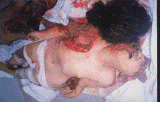Alhamdulillah, akhirnya aku dah selamat kembali ke Simferopol. Perjalanan dengan train yang lebih kurang 30 jam memeang meletihkan. mujurla aku bole tidur dalam train tu. walaupun tak berapa nyenyak, tapi boleh lelapkan juga. On the pergi ke Kyiv, dalam compartment aku ada 3 orang perempuan. Masalah betul. aku dah mula menggelabah. aku just naik atas bed aku dan duk diam2 sampai pagi aku turun dari bed bila train dah betul2 dekat dengan Kyiv. tu pun setelah diminta untuk keluar kejap. diorang nak salin baju.
Sampai aje di Kyiv, aku cepat-cepat ambil tube ke embassy. yelah, aku janji dengan diorng nak datang pagi. last-last train sampai kul 11.30. aku sampai aje, diorang dah siap tunggu. aku selesaikan urusan aku, aku ke Chinese rynok (market) beli barang-barang sket. macam-macam aku beli. sos tiram, cili boh, taucu, shrimp chip etc. yelah, bukan senang nak jumpe bende-bende tu sume kt Simferopol. lepas tu terus aje aku balik semula ke vokzal (train station). aku duk usha ticket, yang ada kul 8.21 malam aje. sudah, jam baru kul 2.00. erm...nak buat gapo ek?? ade >6 jam lagi. aku naik ke komfortniy zal, and lepak2 kat situ. la, tertido plak.
sedar2 dah kul 4 lebih. aku turn kebawah untuk letak barang kat kamera hranenniya (bilik simpan. on the way aku turun ke bilik tu (bilik tu duk bawah tanah), tiba-tiba ada seorang hamba Allah jatuh kat depan aku. lah, pengsan la plak pakcik ni. orang2 kat sekeliling dah jerit 'we need doctor" (of course dalam bahasa russian. aku pun dengan tak malunye mengaku yang aku doctor.aku pun letak barang-barang aku kt lantai n terus check carotid pulse die erm, ada. sah2 pakcik ni mabuk, coz mulut die ada bau alcohol. anyway, aku terus monitor die punye pulse. takut gak tibe2 cardiopulmonary arrest. aku dah siap2 takut kena buat resussitation. sampai aje medic team aku terus bagi report tentang vital sign die. erm, just cerebral concussion, i guess. erm aku jadi hero beb! pengalaman pertama aku berdepan dengan situasi mcm ni by myself.
CARDIORESPIRATORY ARREST
DEFINITION
Cardiorespiratory arrest is cessation of cardiac and respiratory
function. In practice, the term is also applied to acute severe
cardiorespiratory dysfunction.
Severe dysfunction of either the cardiac or respiratory system, if not
rapidly corrected, will result in failure of the other.
TOXIC CAUSES
Numerous toxic agents may result in cardiorespiratory arrest. This
complication is more likely to occur in poisoning of subjects with
underlying cardirespiratoy disease. Important examples, classified
according to underlying mechanism, include:
Depression of central respiratory drive
Barbiturates
Benzodiazepines and other sedative-hypnotic agents
Ethanol
Opioids
Phenothiazines
Propoxyphene
Tricyclic antidepressants
Weakness of respiratory muscles
Botulism
Certain fish and shellfish poisoning (tetrodotoxin, saxitoxin)
Cholinesterase inhibitors (organophosphates/carbamates & nerve
agents)
Curare-like neuromuscular blockers
Snakebite
Strychnine
Tetanus
Non-cardiac pulmonary oedema or pneumonitis
Chlorine and other irritant gases and vapors
Cholinesterase inhibitors (organophosphates/carbamates & nerve
agents)
Paraquat
Phosgene
Pulmonary aspiration of gastric contents or petroleum distillates
Salicylates
Decreased cardiac contractility
Barbiturates
Beta adrenergic blockers
Calcium channel blockers
Ergotamines
Type Ia or Ic antiarrhythmics
Tricyclic antidepressants
Hypotension from volume loss
Amanitin-containing mushrooms
Arsenic
Colchicine
Copper sulfate
Iron
Bradycardia or AV block
Beta-adrenergic blockers
Calcium antagonists
Cholinesterase inhibitors (organophosphates/carbamates & nerve
agents)
Digitalis and other cardiac glycosides
Tricyclic antidepressants
Ventricular tachycardia or fibrillation
Amphetamines and related stimulants
Antihistamines (terfenadine and astemizole)
Aromatic and halogenated petroleum distillates
Caffeine
Chloral hydrate
Chloroquine and hydroxychloroquine
Cocaine
Digitalis and other cardiac glycosides
Fluoride
Phenothiazines (especially thioridazine)
Quinidine and other Type Ia antiarrhythmic agents
Theophylline
Cellular Hypoxia
Carbon Monoxide
Cyanide
Hydrogen Sulfide
NON-TOXIC CAUSES
Anaphylaxis
Cardiac arrhythmias
Cardiac tamponade
Electrolyte disturbances
Hypothermia
Hypovolaemia
Myocardial infarction
Pulmonary Embolus
Sepsis
CLINICAL FEATURES
The patient with cardiopulmonary arrest is usually unresponsive, with
absent or agonal respirations, and absent or barely detectable pulses.
The cardiac monitor may show any rhythm, but most often asystole,
ventricular fibrillation or extreme bradycardia.
DIFFERENTIAL DIAGNOSIS
Hypothermia
Vasovagal syncope
RELEVANT INVESTIGATIONS
Treatment takes precedence over investigation in the initial
management of cardiorespiratory arrest.
A cardiac monitor is essential to determine the electrical activity of
the heart and should be applied immediately and followed continuously.
The following investigations may be useful as resuscitation
progresses:
Arterial blood gases
Chest x-ray
ECG
Serum electrolytes including calcium and magnesium
Echocardiography
TREATMENT
The patient must be treated immediately. The priorities in management
are as follows:
a) Establish a secure airway, initially by positioning and
suctioning, then with definitive measures such as
endotracheal intubation.
b) Support breathing by assisting ventilation with a bag-valve
mask device followed by mechanical ventilation. Administer
supplemental oxygen.
c) Obtain intravenous access by the most rapid means possible
and commence continuous cardiac monitoring. Assist the
circulation with closed chest compressions until a
spontaneous cardiac output is re-established. Direct
current cardioversion of toxic ventricular dysrhythmias is
almost never successful and should not take precedence over
correction of hypoxia, external cardiac compression and
administration of specific antidotes. External or
transvenous cardiac pacing may be useful in severe
bradycardias.
d) Drugs: Atropine and adrenalin should be administered
according to standard cardiopulmonary resuscitation
guidelines.
Where the causative toxin is known or suspected, the following
specific antidotes are indicated:
Beta blockers Glucagon
Calcium channel blockers Calcium, Glucagon
Cardiac Glycosides Digoxin-specific Fab fragments
Chloral Hydrate Beta-blockers
Caffeine, Theophylline Beta-blockers
Hydrofluoric Acid Calcium
Organophosphorus agents Atropine, Oximes
Tricyclic antidepressants Sodium Bicarbonate
Type 1a/1c antiarrhythmics Sodium Bicarbonate
CLINICAL COURSE AND MONITORING
Not all patients who develop cardiorespiratory arrest will survive the
acute resuscitation. However, the prognosis for cardiorespiratory
arrest of toxic origin is, especially in young otherwise healthy
subjects, often more favourable than that of arrest from other causes.
A good outcome is possible even after very prolonged resuscitation.
The clinical course is dependent on the underlying agent. Intensive
monitoring and support of cardiorespiratory function is necessary
until toxicity resolves.
LONG TERM COMPLICATIONS
Hypoxic brain injury
Myocardial infarction
Thursday, February 07, 2008
Catatan Perjalanan
Posted by
Zulfahimi bin Husain
at
1:07 pm
![]()
![]()
Subscribe to:
Post Comments (Atom)







No comments:
Post a Comment